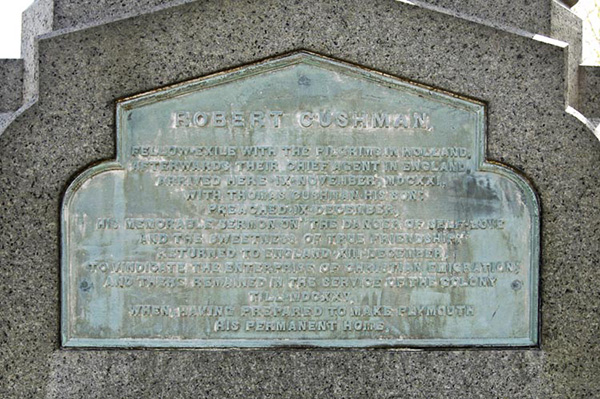Share and share alike - 1621

A memorial stone erected to Robert Cushman.
Introduction
By 1621, Plymouth’s settlers were sick of the share-and-share-alike policy their English backers had adopted. Many colonists wanted to parcel the common land into private chunks. Deacon Robert Cushman warned them strongly against this kind of talk, which he said was selfish, and warned them that the merchants financing the colony were in no mood to be trifled with. If the colonists hoped for future supplies, they had to agree to company terms. The sermon he preached against self-love on this day, 9 December 1621, was the first recorded and printed in New England.
The collectivist principles that Cushman espoused actually nearly ruined the colony, which only began to thrive when free enterprise was embraced. Colonial leader William Bradford later wrote bitterly about the ruinous tendency of the company’s share-alike policy, which he ended in 1623. He said that it caused them to languish in misery and “was found to breed much confusion and discontent and retard much employment.”
Quote
“...it is lawful sometimes for men to gather wealth, and grow rich, even as there was a time for Joseph to store up corn, but a godly and sincere Christian will see when this time is, and will not hoard up when he seeth others of his brethren and associates to want, but then is a time, if he have anything to fetch out and disperse it...”
Cushman, Robert. “A Sermon Preached at Plimmoth in New England, December 9, 1621 in an Assemblie of his Majesties faithful Subjects, there inhabiting. Wherein is shewed the danger of selfe love, and the sweetnesse of true Friendship. Together with a Preface, shewing the state of the Country, and Condition of the Savages.”





